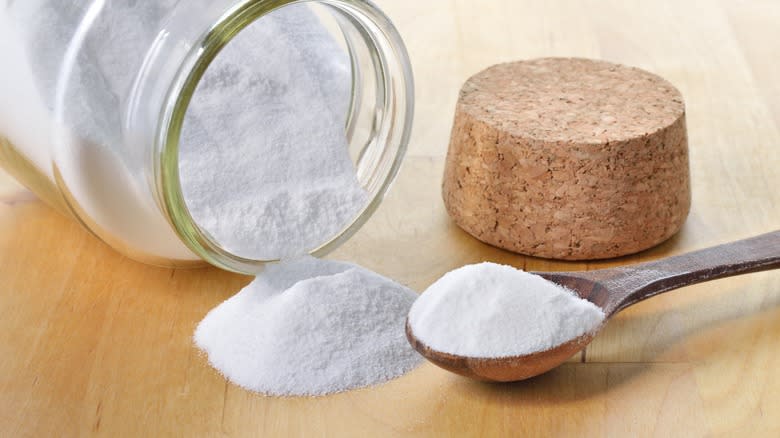The Ratio To Remember When Substituting Baking Powder For Baking Soda

There's nothing quite like the excitement and sweet anticipation of creating something delicious from scratch. However, when it comes to baking, that excitement can quickly turn to frustration when you realize you're missing a key component. You've preheated the oven, laid out all your equipment and utensils, and then you discover you're out of baking soda. This can really throw you off course, especially since baking soda plays a crucial role as a leavening agent, which is essential for giving your baked goods the right rise and texture. Fortunately, there's a solution that's likely already in your pantry where the baking soda was supposed to be: baking powder.
Yes, you can substitute baking powder for baking soda, but it's not a simple one-to-one swap. The ratio to remember is 1:3. So, for every teaspoon of baking soda your recipe calls for, you'll use three teaspoons of baking powder. Why this specific ratio? While quite similar, baking soda and baking powder are not the same thing; each functions slightly differently due to their chemical makeup. Here's how.
Read more: Hacks That Will Make Boiling Your Eggs So Much Easier
Why You Need More Baking Powder

Baking soda is pure sodium bicarbonate, a base that needs both an acid and moisture to activate and produce carbon dioxide gas, which causes your dough or batter to rise. On the other hand, baking powder is a combination of sodium bicarbonate and an acid (usually cream of tartar). Since baking powder already contains an acid, it only needs moisture to activate, making it a more self-contained leavening agent. With that in mind, the reason you need more baking powder than baking soda is because baking soda, by its nature, is a stronger leavening agent than baking powder — about three to four times stronger. This potency is precisely why you can't substitute them on a one-to-one basis.
But this substitution does more than just affect the volume of your baked goods; it can also influence the taste. Since the baking powder brings its own acid, the recipe's existing acid doesn't get neutralized as it typically would by baking soda. In practice, this means that if your recipe calls for baking soda and an acid like buttermilk or yogurt, replacing the soda with baking powder could leave you with a tad more tanginess than intended. That's not necessarily a bad thing, however, for those seeking to maintain the original flavor as closely as possible, switching some of the acidic ingredients with a neutral alternative could be useful. For instance, you could cut lemon juice with water or use whole milk instead of tangy buttermilk.
Read the original article on Tasting Table.

